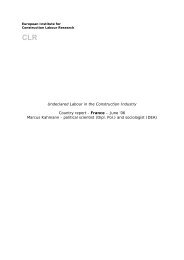Japan – what can we learn? - Construction Labour Research
Japan – what can we learn? - Construction Labour Research
Japan – what can we learn? - Construction Labour Research
You also want an ePaper? Increase the reach of your titles
YUMPU automatically turns print PDFs into web optimized ePapers that Google loves.
most of its importance since then. In this Totei-system an experiencedworker, who mostly worked independently (i.e. as a self-employed)agreed to employ and to teach young workers on the job. Obviouslythey had to pay for the vocational training, but they got some moneyfor good work. In a way it was a team or a gang, which offered itscommon po<strong>we</strong>r of work to a site manager or a company. But since thisarrangement hardly exists anymore, the system of training haschanged.There is no general system of vocational training, but there are 202schools (120 run by Zenkensoren, the by far biggest trade union in theconstruction industry, 80 by Zenkenren and organised by theemployers’ federation, and 2 by the big companies), where youngworkers <strong>can</strong> <strong>learn</strong> the basics of the trade, which is normally one of thethree trades mainly used on sites. Those schools train about 20 to 30workers, who have to attend a course once a <strong>we</strong>ek. All the rest is<strong>learn</strong>ing on the job.According to the interview with Kenseiken, poor skills result in a highnumber of accidents with some seriously hurt and even dead victims.According to the colleagues at Rengo-Rials, the sector’s badperformance (including low productivity) is mainly caused by thissituation. There seems to be a growing will to change the system of<strong>learn</strong>ing-by-doing or to build up a system of vocational training toimprove the economic performance of the sector. But I am not so sureabout the sector’s capability to meet this will.The share of skilled workers in the total workforce (on sites and inadministration) is small in the market of large buildings, bigger in thehousing market. But it is difficult to talk of skilled workers, becausethe system in which they become skilled is totally different from mostof the systems <strong>we</strong> know <strong>–</strong> a bit reminiscent of the British system.In the interview it was more than once stated, that the system is“Ameri<strong>can</strong>ised”, which means, that there are not so many skills andnot so many skilled workers on the sites. But there are skilled workersin the administration of the companies and in the supervisory andmanagement bodies.CLR News No 2/200615









